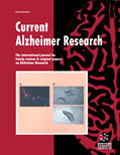To find the most relevant journal, please insert appropriate keyword to facilitate search.
Search Results: car
Current Alzheimer Research
ISSN: 1567-2050 (Print)
eISSN: 1875-5828 (Online)
Impact Factor :
1.8
CiteScore:
4
Editor-in-Chief:
Special Issues With Active Call for Papers
Machine Learning in Neuroimaging of Dementia and Normal Aging
The application of Artificial Intelligence (AI) in medical imaging has significantly transformed the field of medical diagnostics, enabling faster and more accurate analyses. This special issue aims to gather groundbreaking research and innovative applications that leverage AI to advance medical imaging analysis in the field of dementia and normal aging. We welcome submissions exploring topics on - AI classification of dementia subtypes - AI prediction of AD conversion and dementia disease progression - AI MRI... see more
Linear and Non-Linear Signals from the Brain: from the Basic to Clinical Application
Neurodegenerative diseases are increasing in the general population and have been defined by the World Health Organization (WHO) and Alzheimer's Disease International (ADI) as a global public health priority. Data from the WHO Global Action Plan 2017-2025 indicates that in 2015, neurodegeneration-related diseases affected 47 million people worldwide, a figure expected to increase to 75 million by 2030 and 132 million by 2050, with approximately 10 million new cases per year (1 every 3 seconds).... see more
Virtual Reality-Based Interventions for Cognitive Rehabilitation in Alzheimer’s Disease
Virtual reality (VR) has been a widely used tool for the rehabilitation of patients in the last two decades, both in the motor and cognitive aspects. VR-based applications are a form of non-pharmacological therapy that has proven effective as an adjuvant treatment. VR has also been shown to be a tool that can improve the quality of life and well-being of people with dementia. Although great progress has been made in the motor aspect, there... see more
Regulation of Immunosenescence in Neurodegenerative Disorders: Mechanisms, Implications, and Therapeutic Strategies
Scope: Growing evidence has suggested that immunosenescence, an aging-associated change in immune function, plays a critical role in the progression and severity of neurodegenerative disorders including Alzheimer's disease (AD), Parkinson's disease, Huntington's disease, and multiple sclerosis. This special issue aims to investigate the mechanisms underlying immune cell aging and exhaustion, their role in neuroinflammation, and their contribution to the pathology of neurodegenerative disorders. By focusing on recent advancements in understanding how aging immune cells influence... see more
Leading Alzheimer Disease Prevention with Precision Health Strategies.
The rising number of patients with Alzheimer’s disease (AD) is a concerning reality in our society. Despite tremendous public-private efforts, finding an appropriate treatment for Alzheimer’s disease prevention has not been successful. One of the reasons behind this failure is the urge to find “a treatment that fits all sizes”, ignoring the focus on “the right drug, the right dose, and the right people”. Notably, AD patients have several clinical comorbidities, such as diabetes, obesity,... see more
New Advances in the Prevention, Diagnosis, Treatment, and Rehabilitation of Alzheimer's Disease
Aims and Scope: Introduction: Alzheimer's disease (AD) poses a significant global health challenge, with an increasing prevalence that demands concerted efforts to advance our understanding and strategies for prevention, diagnosis, treatment, and rehabilitation. This thematic issue aims to bring together cutting-edge research and innovative approaches from multidisciplinary perspectives to address the complex challenges posed by Alzheimer's disease. Aims: . Explore Emerging Preventive Measures: Investigate novel strategies and interventions aimed at preventing or delaying the onset... see more
Perspectives and Dynamic Predictive Factors Related to Mild Cognitive Impairment (MCI) and Alzheimer’s Disease (AD) or Conversion from MCI to AD
Cognitive decline, especially Alzheimer’s disease (AD), is a neurodegenerative disorders characterized by the cerebral accumulation of amyloid beta (Aβ) and tau and other proposed pathophysiologies. Mild cognitive impairment (MCI) and AD impair the quality of life of the elderly and pose huge public health burdens to society. The development of MCI and AD is a consequence of the interaction of genetic and environmental factors including ApoE4 and other genetic risk factors, lifestyle, education level, metabolic... see more
Integrative Perspectives on Neurodegeneration and Aging: From Molecular Insights to Therapeutic Strategies
The increasing burden of age-related neurodegenerative diseases demands an immediate and pressing need for research in all aspects, from molecular mechanisms to therapeutic interventions. The special issue in Current Alzheimer Research "Integrative Perspectives on Neurodegeneration and Aging: From Molecular Insights to Therapeutic Strategies" aims to highlight the summary of state-of-the-art advances and perspectives into the understanding and management of these disorders. With the aging population of the world, there is an increasing incidence of these... see more
Enhancing Alzheimer's Disease Diagnosis and Treatment Efficacy Prediction with Explainable AI, Radiomics, Biomarkers, and Multimodal Neuroimaging
The thematic issue, Enhancing Alzheimer's Disease Diagnosis and Treatment Efficacy Prediction with Explainable AI, Radiomics, Biomarkers, and Multimodal Neuroimaging, aims to bridge the gap between advanced computational techniques and clinical practice in Alzheimer’s disease research. Alzheimer’s disease poses significant challenges in early diagnosis, disease progression monitoring, and predicting treatment efficacy. This issue will explore the integration of explainable artificial intelligence (XAI), radiomics, biomarkers, and multimodal neuroimaging to address these challenges. By leveraging XAI, the focus... see more
Diagnostic and therapeutic biomarkers of dementia
Dementia affects 18 million people worldwide. Dementia is a syndrome of symptoms caused by brain disease, usually chronic or progressive, clinically characterized by multiple impairments of higher cortical functions such as memory, thinking, orientation, and learning. In addition, in the course of dementia, cognitive deficits are observed, which often hinder professional activity, social functioning, and performing daily activities. The most common types of dementia are Alzheimer's disease (AD) and dementia with Lewy bodies (DLB). Vascular... see more
